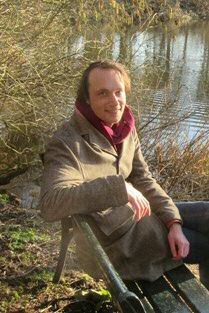Leaving no scroll unturned

The Dead Sea Scrolls contain the oldest exemplars of the Hebrew Bible and many other previously unknown texts. Their discovery in the 1940s and 1950s fundamentally changed how we think about ancient Judaism and early Christianity. But they also brought about many new research questions and challenges. One such challenge is that we know very little about the community behind these scrolls and especially about the ways in which they engaged with their manuscripts. In other words: how were these texts actually used in antiquity? These are difficult but very exciting questions. We have to try to bridge 2000 years and figure out what people actually did with the manuscripts they owned.
For this PhD-thesis Ayhan investigated a particular type of manuscript: opisthographs – scrolls that contain text on both the front and back side. ‘We don’t have very many of these, but the ones that did survive offer us something very interesting: they preserve multiple texts next to each other on one single scroll. These opisthographs could be used to create collections. Two or three different texts were brought together on a single manuscript in order to be read and studied collectively. Sometimes this leads to intriguing combinations of texts: texts that contain different socio-religious ideas were nevertheless read next to each other. I have focused on one papyrus opisthograph that contains parts of three different liturgical texts from the first century BCE. I argue that this specific manuscript was used as a prayer collection; small signs in the margins indicate the start of new sections. I imagine that these texts were brought together in order to be studied or recited.’
Ayhan also compared the Dead Sea Scrolls with a different group of manuscripts: the Herculaneum papyri from Roman Italy. ‘It turns out that also within this corpus opisthographs were used to create collections. This shows that scribes from different regions of the Mediterranean world developed similar, dynamic approaches to engage with their texts.’
Promotion ceremony
On Thursday 16 June, Ayhan Aksu will defend his thesis, entitled Leaving No Scroll Unturned: a Study of Opisthographic Practices in the Dead Sea Scrolls and Texts Collectioning in the Ancient World, during his PhD ceremony in the presence of his supervisors Prof. M. (Mladen) Popović and Prof. E.J.C. (Eibert) Tigchelaar.
When: Thursday 16 June 2022
Starts at: 16.15 p.m.
Where: Academy Building
Live stream: You can follow the ceremony by livestream as well via this link.
Dissertation: Link.
More news
-
15 September 2025
Successful visit to the UG by Rector of Institut Teknologi Bandung
